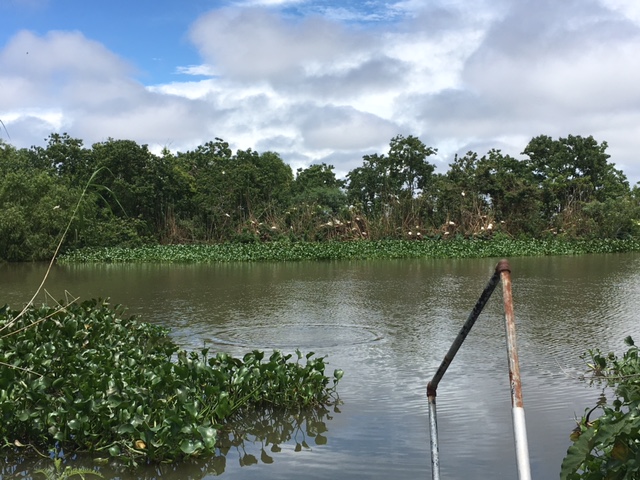To kick off Season Two Gina and Kelly travel to the end of the world: Venice, Louisiana, which claims to be the southernmost point in Louisiana accessible by car. Traversing through landscapes reminiscent of True Detective, they find oil refineries, fishing communities, and estuary life — alligators, egrets, herons, spoonbills, ibises, and several other rare species of birds. They leave with questions about how our dependence on oil has transformed coastal wetlands into sacrificial spaces, as Louisiana continues to lose approximately 24-38 football fields of land every day.
The End of the World
Venice is just under two hours south of New Orleans, at the tip of Plaquemines Parish. Gina and Kelly are surprised by how quickly the cityscape of New Orleans gives way to suburban ranch homes and then to rural landscapes. They are also taken by the juxtaposition of industrial oil refineries on one side of the highway and wetlands on the other. As the road narrows to two lanes, coastal wildlife becomes more prevalent. After watching an egret catch a fish out of the road in front of them, they exit the car and wade through the water to make sure that it is passable.
The road, er, gulf . . .
Finally, they pull up to a sign delineating that they have reached the southernmost point in Louisiana (though further investigation suggests that designation might rightly belong to Port Fourchon). They explore the town of Venice, following signs for a marina with a bar where fishermen go to wait out rainstorms.
* Not the southernmost point in Louisiana. Photo by Tony.
From a small pull-off on the side of the road, they can see rookeries with hundreds of ibises and egrets. Swimming around the perimeter of the rookeries, large alligators begin their own investigation of Gina and Kelly. In addition to the wildlife, the landscape is marked by groves of dead and dying trees rising out of the water.
Ghost trees.
Driving home, they discuss rising coastal waters and wetland loss. Gina remarks that she will be sad if this place disappears in her lifetime, and the two contemplate how much of the land might have been lost already. After returning home, many people ask Gina if the rapid pace of coastal erosion is due to Hurricane Katrina, trying to tie the changing landscape to the memorable event. However, coastal wetland loss was happening before Hurricane Katrina, which forces us to consider how our dependence on fossil fuels makes us culpable and how we might work to slow coastal wetland loss and protect these habitats for the people and wildlife who depend on them.
Ibis rookery (not pictured: Kelly's new alligator friends).
We would like to thank all of the people who made this episode possible: Ann for donating her map; Tony for offering guidance and taking photos of us at the end of the world; and Jennie and Chip Lightweis-Goff for their New Orleans hospitality.
Information on Louisiana's wetland lost:
Information from the U.S. Geological Survey about Louisiana coastal wetlands
From Instagram: #endoftheworld













